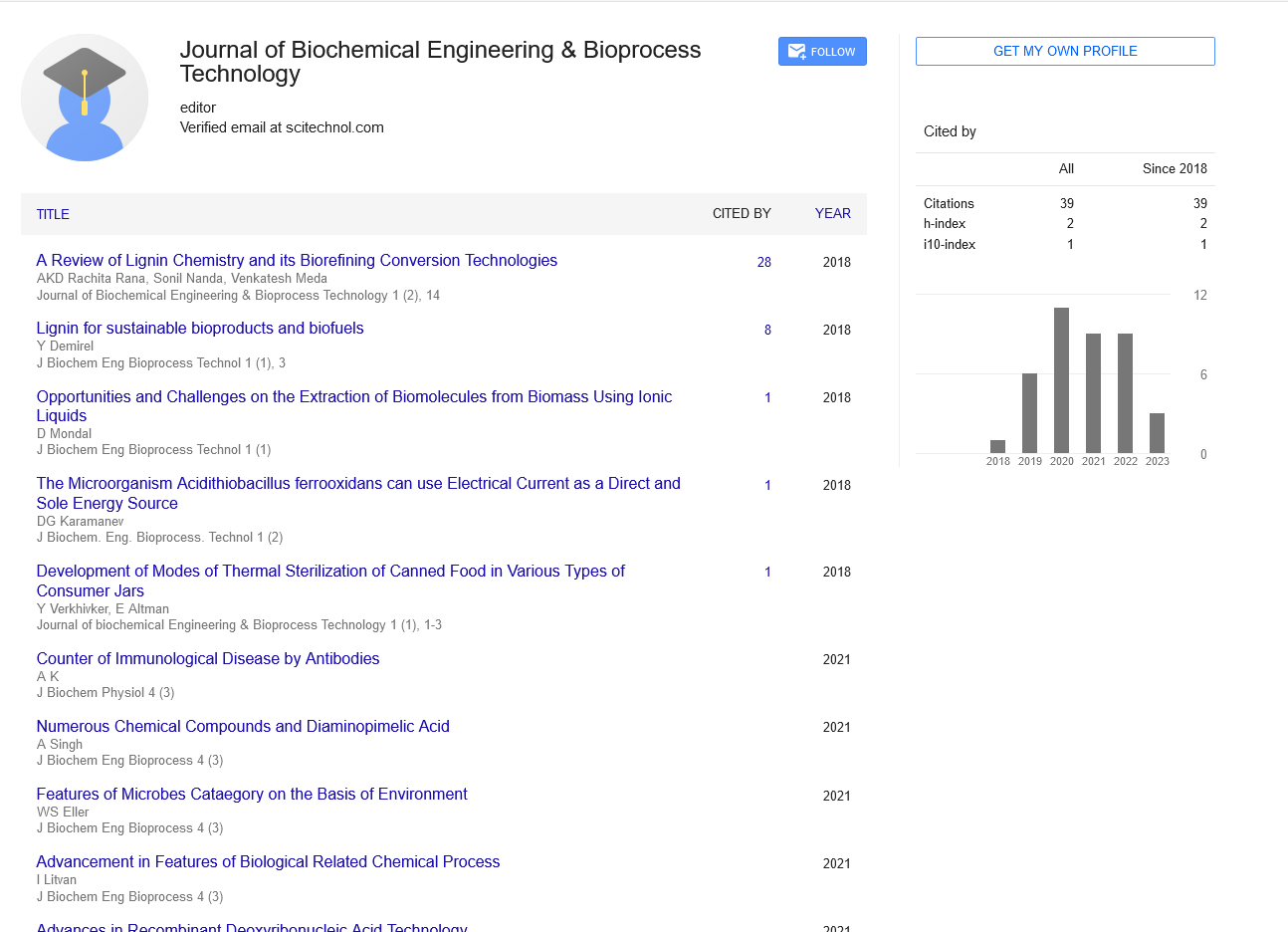Commentary, J Biochem Eng Bioprocess Vol: 4 Issue: 6
Cells and Adult Organisms of Bio-Process
K Srinivasen Ayer*,
Department of Biotechnology, Ramaiah Institute of Technology Benguluru, Indi
*Corresponding Author:K Srinivasen Ayer
Department of Biotechnology, Ramaiah Institute of Technology Benguluru, Indi
E-mail: srinivasenayerk@gmail.com
Received:Novemer 1, 2021; Accepted date: November 15, 2021; Published date: November 22, 2021
Abstract
Stem cells are unspecialized cells that develop into the specialized cells that make up the different types of tissue in the human body. They are characterized by the ability to renew themselves through mitotic cell division and differentiating into a diverse range of specialized cell types.
Keywords: Adult O rganisms
Editorial Note
Stem cells are unspecialized cells that develop into the specialized cells that make up the different types of tissue in the human body. They are characterized by the ability to renew themselves through mitotic cell division and differentiating into a diverse range of specialized cell types. They are vital to the development, growth, maintenance, and repair of our brains, bones, muscles, nerves, blood, skin, and other organs .Stem cells are found in all of us, from the early stages of human development to the end of life. Stem cell research holds tremendous promise for the development of novel therapies for many serious diseases and injuries. While stem cell based treatments have been established as a clinical standard of care for some conditions, such as hematopoietic stem cell transplants for leukemia and epithelial stem cell-based treatments for burns and corneal disorders, the scope of potential stem cell-based therapies has expanded in recent years due to advances in stem cell research. It has been only recently that scientists have understood stem cells well enough to consider the possibilities of growing them outside the body for long periods of time.
With that advance, rigorous experiments can be conducted, and the possibility of manipulating these cells in such a way that specific tissues can be grown is real. A stem cell is a non-specialized, generic cell which can make exact copies of itself indefinitely and can differentiate and produce specialized cells for the various tissues of the body2 .Stem cells are cells found in most, if not all, multi-cellular organisms.
They are characterized by self renewal and potency i.e. - the ability to renew themselves through mitotic cell division and differentiating into a diverse range of specialized cell t. They are vital to the development, growth, maintenance, and repair of our brains, bones, muscles, nerves, blood, skin, and other organs3. Laboratory studies of stem cells enable scientists to learn about the cells’ essential properties and what makes them different from specialized cell types. Scientists are already using stem cells in the laboratory to screen new drugs and to develop model systems to study normal growth and identify the causes of birth defects20. Research on stem cells continues to advance knowledge about how an organism develops from a single cell and how healthy cells replace damaged cells in adult organisms. Stem cell research is one of the most fascinating areas of contemporary biology, but, as with many expanding fields of scientific inquiry, research on stem cells raises scientific questions as rapidly as it generates new discoveries21. Over the past year, adult stem cells have been used either exclusively or in combination with other treatments to achieve significant "healthcare benefits" for sufferers of the every tissue of human body the production of Cardiomyocytes (CMs) from Induced Pluripotent Stem Cells (IPSCs) presents great potential for patient-specific regenerative therapies and cardio toxicity drug evaluation.
The successful translation of iPSCs to these fields requires the development of robust bioprocesses capable of producing CMs in high quality, quantity and purity. Traditional protocols for CM differentiation of iPSCs lack control and robustness and are thus inefficient. Furthermore, efficient cryopreservation and hypothermic storage strategies are a demand, as cell banking and transport is a prerequisite for clinical and industrial applications. The main aim of this thesis was the evaluation of different bioreactor systems for the production and purification of miPSC-derived CMs. Novel strategies for CM cryopreservation were tested. Also, CMs were used to study the cardio protective effect of antioxidant compounds. The wave bioreactor was the most suitable system for CM differentiation, allowing high differentiation yields (60 CMs/input of miPSC) and the production of clinically relevant numbers of CMs (2.3 × 109 CMs), simultaneously reducing bioprocess duration when compared to stirred tank bioreactors.
Produced CMs presented typical structural and functional features. Moreover, CryoStor TMCS10 and FBS+10%DMSO (with ROCKi pretreatment) revealed to be suitable solutions for cryopreservation of miPSC-derived CMs, achieving high cell recoveries after thawing. In addition, HypoThermosol-FRS enabled hypothermic storage of CMs for up to 7 days. Finally, it was shown that CMs derived from miPSCs present potential to be used in the development of cardioprotective assays. This work demonstrates the establishment of a fully integrated bioprocess, capable of producing high quality miPSC-derived CMs in environmentally controlled bioreactors and ensuring efficient cryopreservation and storage of the produced cells. Hopefully, the knowledge acquired with this work can be translated to human iPSCs, presenting a relevant step forward towards the application of human CMs to clinical and industrial applications, such as cardiac regeneration, disease modeling and cardio toxicity and cardio protective cell based assays.
 Spanish
Spanish  Chinese
Chinese  Russian
Russian  German
German  French
French  Japanese
Japanese  Portuguese
Portuguese  Hindi
Hindi 